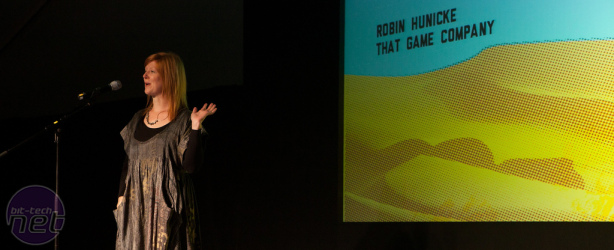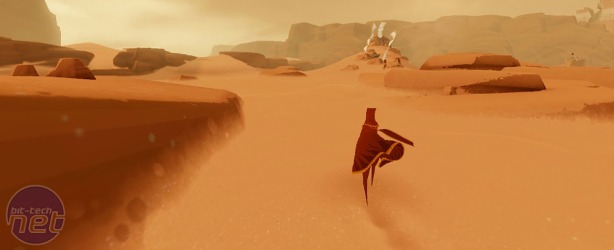
Robin Hunicke Interview
BG: Would you say that, having worked for EA and now ThatGameCompany, you’ve seen both sides of the developer-publisher conflict?RH: Oh, for sure. I’ve been on both sides of the fence, as it were. I’ve actually had conversations with my producing partner at Sony that people have had to have with me as their producing partners. I’ve seen it all. Actually, I can’t say that. I’ve seen a lot. But I haven’t seen it all, not yet, knock on wood.
BG: Do you think that a studio-distributor relationship is less or more antagonistic than a publisher-developer one?
RH: I don’t know. I’ve never worked with just a plain distributor, like a game for the iPhone or web.
BG: I mean with Sony as TGC’s acting distributor.
RH: Well, our relationship with Sony is a little bit like a fairytale. You know, Kellee [Santiago] and Jenova [Chen] graduated from college and they had this crazy idea that they were going to make games about emotions and create this new genre of art game... and Sony went for it! Not only did they go for it but they supported them through three really experimental projects. If it weren’t for very important people at Sony believing very strongly in our mission I’m not sure those games would exist.
BG: That’s a feeling that a few developers seem to share; that Sony is the more fertile ground for new ideas.
RH: Absolutely. I can’t believe sometimes how amazing and diverse the portfolio is for PlayStation Network. If you look at the games... The last event that I did, there were so many amazing games in the room with us that it was hard for me to stand around and watch Journey because I wanted to go play [PixelJunk] 4am... I wanted to go play Papo & Yo and Closure and Retrograde. I mean, there are all these games coming out and they’re all people that I know and really appreciate. It was actually kind of shocking and, the Vita? I can’t wait to play Sound Shape. I’m dying to play it right now!
BG: Is Vita something which ThatGameCompany would be interested in exploring as a platform?
RH: I can’t imagine why not. Right now, the thing that we’re so interested in about Journey is that it’s a networked game and we’ve been able to have a relationship with the fans by doing the beta and creating this conversation with our fans. And that’s definitely something we’re excited about... I can’t think of any reasons why the Vita would be any different, especially since it seems like it’s got a great development environment. I’ve heard great things about it. But right now it’s just Journey... It’s hard not to day-dream of the future but we really have to stay focused until we’re done.
BG: When you say that Kellee and Jenova where interested in creating this new kind of art game genre, there's a lot of that on the PC as well – and Tale of Tales are here [at GameCity Festival] as well.
RH: They’re so great. We love their games – or their notgames, rather.
BG: Is that ‘notgames’ manifesto that they adhere to something that you would apply to your studio as well?
RH: It’s hard to say. I mean, they’d have to be the judge of that. It’s their manifesto.
BG: I just ask because although Journey is very clearly artistic, it still has an aim and goal – maybe it still has what you’d call a win condition?
RH: Well, it’s hard to talk about that because I don’t want to spoil it, so I’m not going to say too much. But Journey is our attempt to create genuine connection between two people – that’s what it is. Whether it’s a game or a notgame, [I don’t know]. It has some traditional elements but the way that you experience them might not be what you would expect. We’re really waiting to hear from you guys –the players – when it’s done. We’re really excited to hear what you have to say because it doesn’t matter what we thought the game was going to be about or what the experience was going to be. What matters is what the players take away from it. It’s something that we cannot predict. I mean, we have no idea.

MSI MPG Velox 100R Chassis Review
October 14 2021 | 15:04











Want to comment? Please log in.